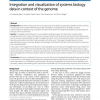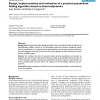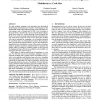799 search results - page 140 / 160 » Function Sequence Genetic Programming |
159
click to vote
BMCBI
2008
15 years 2 months ago
2008
Background: Systematic approaches for identifying proteins involved in different types of cancer are needed. Experimental techniques such as microarrays are being used to characte...
146
click to vote
BMCBI
2007
15 years 2 months ago
2007
Background: A finite state machine manipulating information-carrying DNA strands can be used to perform autonomous molecular-scale computations at the cellular level. Results: We ...
131
click to vote
BMCBI
2010
15 years 2 months ago
2010
Background: High-density tiling arrays and new sequencing technologies are generating rapidly increasing volumes of transcriptome and protein-DNA interaction data. Visualization a...
134
click to vote
BMCBI
2004
15 years 2 months ago
2004
Background: The general problem of RNA secondary structure prediction under the widely used thermodynamic model is known to be NP-complete when the structures considered include a...
219
click to vote
POPL
2009
ACM
16 years 2 months ago
2009
ACM
We study modular, automatic code generation from hierarchical block diagrams with synchronous semantics. Such diagrams are the fundamental model behind widespread tools in the emb...




